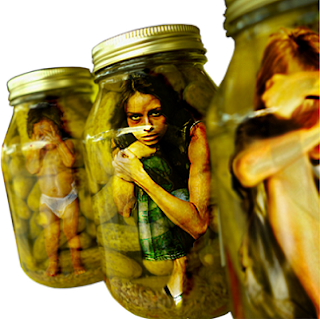Human Trafficking Profanes the Holy Name
Most people argue the Bible says very little about the eradication of slavery. As most of you know, the New Testament can be read as literature that supports the issue of slavery. The most popular text is found in Philemon with Paul giving orders for a slave to return to his slave master. Jesus even uses parables that discuss kings and masters who own slaves. For the longest time, Southern American preachers saw the Bible as the leading defense in the argument for slavery.
But the prophet Amos sees differently. Amos is an eighth century prophet speaking to Israel about how they have fallen away from God’s ordered life. As a matter of fact, Amos condemns Israel for the practice of human trafficking. Amos tells Israel,
Do you see what is happening here? Israel is selling off people for silver and sandals. Israel is selling children for practical goods. This is slave trade. They are selling the poor on the cheap.
And God sees this.
God recognizes this.
God hates this.
God is furious with those who trample their feet on the poor and who sell their children into slavery and goes as far to say the oppressed that are denied justice will soon rise. Evil will be eradicated.
Oh the Bible speaks about slavery. I argue it condemns it. The Minor Prophets like Amos spend the majority of their time complaining about its heinous reality. Amos strictly says, “God will not turn back wrath, for Israel sells the righteous for silver, and the needy for a pair of sandals.” And guess who the needy are: the poor and the young.
This system is known as latifundialization. The ruling elite in a community builds a system of debt slavery. They tax the family farmers and create a system in which farmers can never pay off their debts. They only way to become debt free is either to sell your farm or to sell your children. Debt slavery means you can’t work on your own capital. This is terrible. It dismisses the sanctity of human life.
It is evident in the Book of Amos that God hates this economic model. God has given land to God’s people to be shared, not mistreated. Amos 2 demands readers to think about the relationship between the elite and the poor, for God’s tolerance level for this behavior is zero.
Amos is speaking against debt slavery. Amos condemns this practice. And yet he says more. He tells Israel that because of human trafficking, their worship is impure. Profaning the holy name is not just about holiness laws – you profane the holy name by social injustice. You profane the holy name by selling the poor for sandals. You profane the holy name by tricking children into working in cocoa farms handling pesticides and machetes for little to no pay.
God condemns temple practices due to social injustice. Amos says that because of an unethical lifestyle of Israel’s elite, God has rejected their worship, their sacrifices and their entire religion. God doesn’t want your offerings if you are practicing injustice.
How true is this today? 2800 years later we are still profaning the holy name by facilitating human trafficking, and yet we still show up to church every Sunday morning hoping to be blessed. Amos says God rejects this kind of worship. It puts a sour taste on the lips of God’s mouth. As long as people are being trafficked, worshipers are facilitating social injustices and worship is therefore void.
And the truth is, Israel should know better. Amos 2:10-11 quotes God saying:
Israel should know better. We should know better. This is the theme that goes straight through the book of Amos. God has chosen, rescued and selected Israel in a covenant. God has raised up prophets within their tribes. These prophets call out to the strong that are doing wrong and demand justice.
This is the word we must hear today. God is calling us to know better. How can we knowingly perpetuate the cycle of human trafficking? How can we continually show up on Sunday morning and expect God to bless us here when we are part of the cause out there?
But the prophet Amos sees differently. Amos is an eighth century prophet speaking to Israel about how they have fallen away from God’s ordered life. As a matter of fact, Amos condemns Israel for the practice of human trafficking. Amos tells Israel,
This is what the LORD says:
For three sins of Israel,
even for four, I will not turn back {my wrath}.
They sell the righteous for silver,
and the needy for a pair of sandals.
They trample on the heads of the poor
as upon the dust of the ground
and deny justice to the oppressed.
Father and son use the same girl
and so profane my holy name. (Amos 2:6-7, NIV)
Do you see what is happening here? Israel is selling off people for silver and sandals. Israel is selling children for practical goods. This is slave trade. They are selling the poor on the cheap.
And God sees this.
God recognizes this.
God hates this.
God is furious with those who trample their feet on the poor and who sell their children into slavery and goes as far to say the oppressed that are denied justice will soon rise. Evil will be eradicated.
Oh the Bible speaks about slavery. I argue it condemns it. The Minor Prophets like Amos spend the majority of their time complaining about its heinous reality. Amos strictly says, “God will not turn back wrath, for Israel sells the righteous for silver, and the needy for a pair of sandals.” And guess who the needy are: the poor and the young.
This system is known as latifundialization. The ruling elite in a community builds a system of debt slavery. They tax the family farmers and create a system in which farmers can never pay off their debts. They only way to become debt free is either to sell your farm or to sell your children. Debt slavery means you can’t work on your own capital. This is terrible. It dismisses the sanctity of human life.
It is evident in the Book of Amos that God hates this economic model. God has given land to God’s people to be shared, not mistreated. Amos 2 demands readers to think about the relationship between the elite and the poor, for God’s tolerance level for this behavior is zero.
Amos is speaking against debt slavery. Amos condemns this practice. And yet he says more. He tells Israel that because of human trafficking, their worship is impure. Profaning the holy name is not just about holiness laws – you profane the holy name by social injustice. You profane the holy name by selling the poor for sandals. You profane the holy name by tricking children into working in cocoa farms handling pesticides and machetes for little to no pay.
God condemns temple practices due to social injustice. Amos says that because of an unethical lifestyle of Israel’s elite, God has rejected their worship, their sacrifices and their entire religion. God doesn’t want your offerings if you are practicing injustice.
How true is this today? 2800 years later we are still profaning the holy name by facilitating human trafficking, and yet we still show up to church every Sunday morning hoping to be blessed. Amos says God rejects this kind of worship. It puts a sour taste on the lips of God’s mouth. As long as people are being trafficked, worshipers are facilitating social injustices and worship is therefore void.
And the truth is, Israel should know better. Amos 2:10-11 quotes God saying:
I brought you up out of Egypt,
and I led you forty years in the desert
to give you the land of the Amorites.
I also raised up prophets from among your sons
and Nazirites from among your young men.
Is this not true, people of Israel?"
declares the LORD. (Amos 2:10-11, NIV)
Israel should know better. We should know better. This is the theme that goes straight through the book of Amos. God has chosen, rescued and selected Israel in a covenant. God has raised up prophets within their tribes. These prophets call out to the strong that are doing wrong and demand justice.
This is the word we must hear today. God is calling us to know better. How can we knowingly perpetuate the cycle of human trafficking? How can we continually show up on Sunday morning and expect God to bless us here when we are part of the cause out there?




Comments